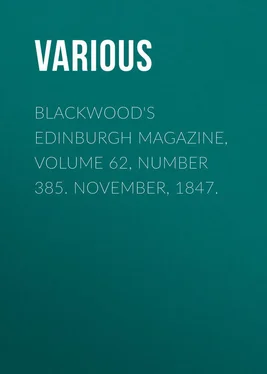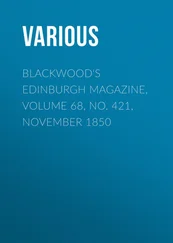Various - Blackwood's Edinburgh Magazine, Volume 62, Number 385. November, 1847.
Здесь есть возможность читать онлайн «Various - Blackwood's Edinburgh Magazine, Volume 62, Number 385. November, 1847.» — ознакомительный отрывок электронной книги совершенно бесплатно, а после прочтения отрывка купить полную версию. В некоторых случаях можно слушать аудио, скачать через торрент в формате fb2 и присутствует краткое содержание. Издательство: Иностранный паблик, Жанр: periodic, foreign_edu, Путешествия и география, на английском языке. Описание произведения, (предисловие) а так же отзывы посетителей доступны на портале библиотеки ЛибКат.
- Название:Blackwood's Edinburgh Magazine, Volume 62, Number 385. November, 1847.
- Автор:
- Издательство:Иностранный паблик
- Жанр:
- Год:неизвестен
- ISBN:нет данных
- Рейтинг книги:4 / 5. Голосов: 1
-
Избранное:Добавить в избранное
- Отзывы:
-
Ваша оценка:
- 80
- 1
- 2
- 3
- 4
- 5
Blackwood's Edinburgh Magazine, Volume 62, Number 385. November, 1847.: краткое содержание, описание и аннотация
Предлагаем к чтению аннотацию, описание, краткое содержание или предисловие (зависит от того, что написал сам автор книги «Blackwood's Edinburgh Magazine, Volume 62, Number 385. November, 1847.»). Если вы не нашли необходимую информацию о книге — напишите в комментариях, мы постараемся отыскать её.
Blackwood's Edinburgh Magazine, Volume 62, Number 385. November, 1847. — читать онлайн ознакомительный отрывок
Ниже представлен текст книги, разбитый по страницам. Система сохранения места последней прочитанной страницы, позволяет с удобством читать онлайн бесплатно книгу «Blackwood's Edinburgh Magazine, Volume 62, Number 385. November, 1847.», без необходимости каждый раз заново искать на чём Вы остановились. Поставьте закладку, и сможете в любой момент перейти на страницу, на которой закончили чтение.
Интервал:
Закладка:
The distance is the chief drawback. Sydney is, by ordinary ship's course, sixteen thousand miles from London, and the voyage, under the most prosperous circumstances, has hitherto occupied about four months. But better hopes are at hand.
On the 20th of last May, a charter was obtained by a company for establishing a steam communication with Sydney, which proposes to make the whole course within about two months . The route is as follows, – making twelve thousand seven hundred and thirty miles in sixty-four days: —
From England to Singapore, by Egypt, eight thousand three hundred and ninety miles. From Singapore to Fort Essington, by Batavia, two thousand miles. From Port Essington to Sydney, two thousand three hundred and forty miles; the rate being one hundred and ninety-nine miles a-day. The first portion occupying forty-two days, – the second, ten, – and the third, twelve.
The subject was, for a considerable time, before government, and various plans of communication had been suggested. – A route by the Isthmus of Darien, and a route by the Cape with a branch to the Mauritius. The route by Egypt and India has at length been chosen, and the most sanguine hopes are entertained of its success. The steam establishment will have the farther advantage of shortening the distance by one-half between Calcutta and Sydney; and reducing it to thirty days, or perhaps less.
Bright prospects, too, are opening for India herself. The great railway is decided on, the engineers are about to embark, and the harvests of cotton and the thousand other tropical productions with which that most magnificent of all countries is covered, will be poured into the bosom of Australia and the world.
It is scarcely possible to look upon the results of establishing railroads in India, without something of the enthusiasm which belongs more to poetry than to statistics. But, "in the Golden Peninsula," there spreads before the Englishman a space of nearly a million and a quarter of square miles, inhabited by about one hundred and thirty-four millions of souls, with a sea-coast of immense extent, washed by two oceans, and bordering on vast countries of hitherto unexplored opulence. The resources of Birmah, Siam, and the Eastern Archipelago, have been scarcely touched by the hand of man. Savage governments, savage nations, and savage indolence, have left those countries almost in a state of nature; yet it is within the tropics that the true productiveness of the earth is alone to be looked for. Our long winters, our mountains, and the comparative sterility of Europe, prohibit that richness of produce which only waits the hand of man in the South, and it is only when the industry of the European shall be suffered to throw its strength into the Asiatic soil, that man will ever be able to discover the true extent of the bounties provided for him by creation.
The three great divisions, or rather three zones of India – the country comprehending the great northern chain of mountains, the belt of plains, from the foot of the mountains to the head of the peninsulas, a breadth of twelve hundred miles; and the peninsula itself, a territory extending from thirty-five degrees north latitude to the equator – give every temperature and every product of the world. The mighty rivers intersecting this region, the Indus, the Ganges, and their tributaries, will soon be occupied by the steamboat; and the railway, running through immense plains on which the harvests of thousands of years have been suffered to perish, will soon develope the powers of the people and the fertility of the soil, by opening to India the market of all nations.
It is to India, that the chief enterprise of British commerce and civilisation should be directed by an intelligent legislature. The country will naturally become a vast British province, and this, not by violence or injustice, but by the course of things, and the interests of India itself. The native princes, reared in vice and indolence, will be speedily found unfit to meet the requisitions of a people growing in instruction. The race will perish, and their power will be made over to England. The Indian, hitherto the slave of a capricious tyranny, will then become the object of a judicious protection, – his property secure, his person safe, his rights guarded, and with equal law, in place of the grasping avarice of a crafty minister, or the hot fury of a drunken tyrant. The Indian subject of England will then form a contrast to the wretched serf of a Rajah, that will be a more powerful pledge of obedience than fifty conquests.
Even now, it can be no longer said, in the words of the eloquent appeal of Burke, that if we left India, we should have no more monuments of our sojourn to show, than if we had been lions and tigers. We shall have to show the steamboat, the railroad, and the true origin and foundation of both, – public honour, public intelligence, and a sense of the rights of subjects and the duties of sovereigns.
The increasing passage of the southern commerce through Torres Strait, had attracted the notice of the British government to the peculiar perils of the navigation. The Strait is one of difficult passage from the state of the currents, reefs, &c., and the difficulty was enhanced by the imperfect nature of the charts. Along the east coast of Australia, and as far to the north as New Guinea, an immense ridge of coral rock extends; and through the gaps in this barrier reef, vessels must find their way to the Torres Strait. The two government vessels, the Fly and the Bramble, were sent out to make a survey of the barrier reef. The especial objects of the expedition being – the survey of the eastern edge of the great chain of reefs – the examination of all the channels through the barrier reef, with details of those which afford a safe passage – and the erection of beacons on their outer islands as guides to the navigation.
The commanders of the vessels were directed to give marked attention to all circumstances connected with the health of the crews, the climate, temperature, products, and science; and especially the phenomena of magnetism. A geologist and a zoologist were added to the expedition, the whole under the command of Captain Francis Blackwood. In order to make the subsequent details more intelligible, we give a brief abstract of the voyage. The Fly, with her tender the Bramble schooner, sailed from Falmouth, April 11, 1842, and made the usual course to the Cape, touching at Teneriffe on the way, where a party ascended the Peak, and determined its height to be twelve thousand and eighty feet above the sea. Reaching Van Diemen's Land in August, and Australia soon after, they sailed from Port Stephens December 19, to commence their survey. After an examination of the Capricorn Group, they commenced the survey of the northern part of the great barrier-reef, up to the Murray Islands.
In the next year, they erected a beacon on Raines Islet to mark the entrance of a good passage through the reef. The rest of the year was spent in surveying Torres Straits. They remained thus occupied till the beginning of 1845, when they sailed for Europe, and anchored at Spithead in June 1845, after an absence of three years.
The result of those investigations was, a large accession to our previous knowledge of the sea to the eastward of Australia, now become important from our settlements; and a survey of five hundred miles of the great chain of coral reefs which act as the breakwater against the ocean.
We have heard much of coral islands, certainly the most curious means of increasing the habitable part of the world; in fact, a new insect manufacture of islands. They are of all sizes. We give the description of a small one of this order in the Capricorn Group, an assemblage of islands and reefs on the north-east coast of Australia, so called from the parallel of the Tropic of Capricorn passing through them.
Читать дальшеИнтервал:
Закладка:
Похожие книги на «Blackwood's Edinburgh Magazine, Volume 62, Number 385. November, 1847.»
Представляем Вашему вниманию похожие книги на «Blackwood's Edinburgh Magazine, Volume 62, Number 385. November, 1847.» списком для выбора. Мы отобрали схожую по названию и смыслу литературу в надежде предоставить читателям больше вариантов отыскать новые, интересные, ещё непрочитанные произведения.
Обсуждение, отзывы о книге «Blackwood's Edinburgh Magazine, Volume 62, Number 385. November, 1847.» и просто собственные мнения читателей. Оставьте ваши комментарии, напишите, что Вы думаете о произведении, его смысле или главных героях. Укажите что конкретно понравилось, а что нет, и почему Вы так считаете.












